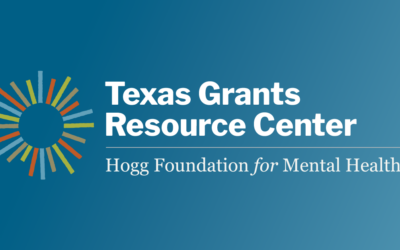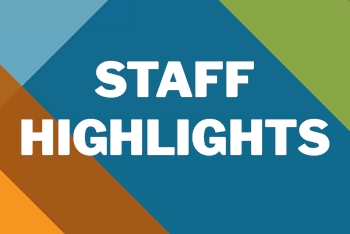Since 2019, employees at the Hogg Foundation have participated in the Special Opportunity Funding Allocations initiative (SOFA). SOFA increases the foundation’s investment in the grantmaking process by giving all employees, regardless of their operational role, an opportunity to support opportunities that align with our mission.
While most of the foundation’s grant initiatives fund long-term, strategic grant programs, SOFA allows us to support short-term projects and be responsive to opportunities and challenges as they arise.
Based on the year’s budget, funding is allocated to employees, who then designate funds for organizations of special interest to them and whose work supports Texas communities’ capacity to advance mental health in everyday life.
Two of this year’s SOFA grants were awarded to programs that support student wellness at the university level. Krystal Mullins, senior operations associate, chose to support Texas Tech University’s Risk Intervention and Safety Education (RISE) program, and Darrell Wiggins, digital content strategist, chose University of Texas at Austin’s Support, Healing, Active listening, Reciprocity, Empowerment (SHARE) program.
Texas Tech RISE
The team at RISE includes Serena Shade, senior director of RISE, and Heather Frazier program manager for the student mental health community. They guide the program’s focus on helping students make safe and healthy decisions through education, resources, and individualized support around topics such as mental well-being, alcohol and drug use, sexual health, and healthy relationships.
“I’ve always believed that education and well-being go hand in hand. When students feel supported mentally and emotionally, they’re better able to thrive academically and personally,” says Serena. “Through workshops, peer education, and campus-wide campaigns, RISE strives to build a culture of care and connection at Texas Tech.”
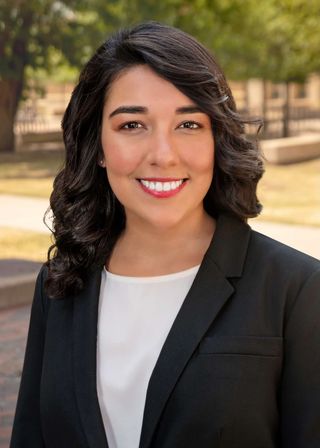
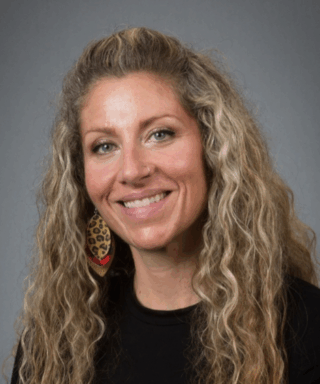
Holistic Approach
Based on the understanding that true well-being involves balance and purpose across every area of a student’s life, RISE’s approach is rooted in the 8 Dimensions of Wellness: emotional, physical, intellectual, social, spiritual, environmental, occupational, and financial.
“Our programming helps students recognize how each dimension contributes to their overall health and empowers them to take small, sustainable steps toward wellness,” says Heather. “I find great purpose in creating spaces where individuals can learn, heal, and grow, and feel deeply fulfilled witnessing others develop the tools to lead healthy and meaningful lives.”
RISE recognizes that college students today are navigating an unprecedented combination of academic pressure, social media influence, and financial stress while striving to build independence. Indeed, students’ needs are unique because of this intersection of transition and expectation. They are often expected to have it all together during one of the most formative, demanding, and uncertain periods of their lives.
“The Hogg Foundation SOFA funds will help us provide peer-led wellness programming, wellness coaching, and outreach materials that reach students who might not otherwise seek help,” says Serena. “With this support, we can enhance our ability to engage the student population, offer innovative programming that promotes mental well-being, and continue to build a campus culture that prioritizes holistic wellness.”
UT Austin Longhorn SHARE Project
Adrian Lancaster is the project specialist for peer support and founder of the Longhorn SHARE Project, a mental health peer support program housed under the Longhorn Wellness Center at UT Austin. When he began his work at the Wellness Center in 2021, Adrian was excited by the possibility of creating a peer support program, particularly post-COVID when the loneliness epidemic among college students truly emerged as a priority.
“Even before COVID, thousands of students I’d spoken to over the years believed that they were alone in their struggles, and many still experience self-stigma around seeking clinical support,” says Adrian. “My vision for this new program was both to help students connect with peers who could relate to those struggles, and to provide a less intimidating, non-clinical option for mental health support on campus.”
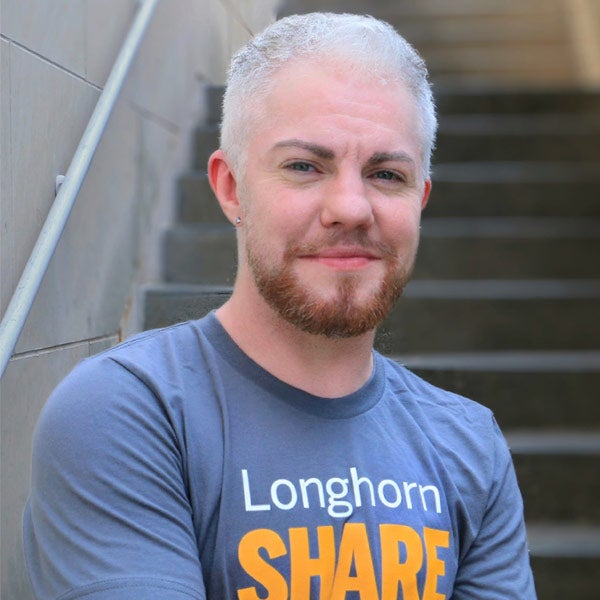
SHARE offers two main services facilitated by trained Peer SHARE Support Specialists: SHARE Communities and SHARE Circles. SHARE Communities are weekly peer support groups, and each one is focused on a specific mental health challenge, interpersonal struggle, or other relatable lived experience. SHARE Circles are essentially one-time talking circles or sharing circles requested by classes, student organizations, and other groups of students at UT Austin to help students open up about their experiences and share wisdom.
Peer Support
“College students naturally turn to peers for support because they are most likely to understand the context of their experiences,” says Adrian. “In SHARE, we harness that tendency but provide our peers with training in active listening, supportive communication skills, Mental Health First Aid, and other relevant content to ensure greater efficacy and avoid causing harm.”
Because it’s a non-clinical program, SHARE appeals to students who don’t want or aren’t ready to seek counseling. But it’s also a great complement to individual counseling because it helps students build social confidence, see how others are coping, and reduce shame by validating and destigmatizing their feelings and diagnoses.
College students’ mental health challenges are unique in many ways. They’re adjusting to a new environment and culture, many of them living on their own away from home, family, and friends for the first time, which can be difficult and lonely. In addition, over a third of students face financial and food insecurity.
“All of that combined with family pressure to succeed, increased difficulty and rigor of coursework, and the common expectation that this should be ‘the best time of their lives’ is a recipe for mental and emotional strain,” says Adrian. “Young adulthood and the college years also happen to be the time in life when most people receive their first mental health diagnosis.”
Because the variety and decentralization of resources at most universities can make it overwhelming to explore them all, the SHARE Project is using SOFA funds to purchase marketing materials and pay stipends to its student advisory group.
“We’re also planning a new SHARE Circle dinner event in the spring,” says Adrian. “It will be an opportunity to help students open up about a topic many can relate to, but few feel comfortable talking about – the culture of competition and comparison that can arise from career anxiety.”
In addition to Texas Tech RISE and the UT SHARE Project, the recipients of the 2025 SOFA grants are:
- Austin Independent School District (Public Sculpture Project for Mental Health Awareness)
- form communities (Texas Peer Support Specialists)
- NAMI Central Texas (Spanish Advocacy Trainings Across Texas)
- San Antonio Food Bank (Operational Fund Support)
- Smithville Public Library (Operational Fund Support)
- Texas Coalition for Healthy Minds (Capacity Building)
- Texans Care for Children (Peer Policy Fellow)
- Texas Judicial Commission on Mental Health (Mental Health Policy Networking)
More from Hogg
moore-fellowship
The Hogg Foundation for Mental Health invites eligible students from The University of Texas at Austin, pursuing a doctorate, to submit a proposal for the 2026 Harry Estill Moore and Bernice Milburn Moore Fellowship. To be eligible for the fellowship, candidates...
Texas Grants Resource Center 2025 Highlights
Texas Grants Resource Center had a busy 2025!
January 2026 Staff Highlights
Here’s a snapshot of the presentations made, events hosted, and honors received by the talented and dedicated staff of the Hogg Foundation during the month of January 2026.

